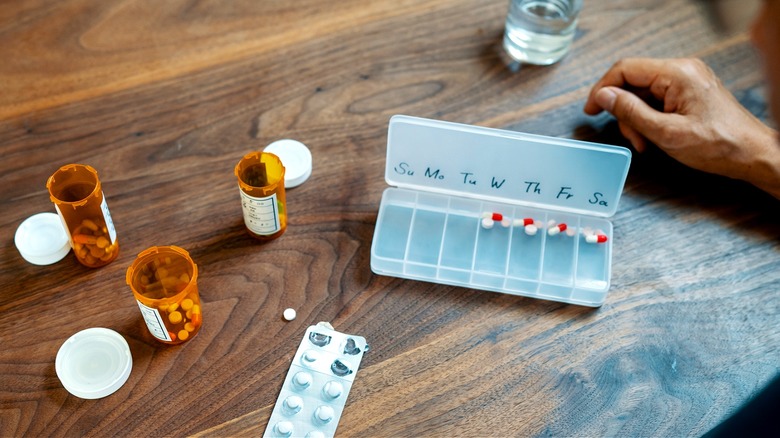Pill Splitting May Be The Trick To Saving Money On Medicine, If Done Safely
If you count yourself among the 66% of Americans taking at least one prescription drug daily (per the Health Policy Institute at Georgetown University), then it's probably appealing to find new ways to lower your out-of-pocket costs, like with copays. Previously, we've covered hacks like having your prescription filled at Costco to save money, which doesn't even require a membership. However, if you want to buy Costco's famous loss-leader rotisserie chicken or even some gold bars (see our guide to buying them), you'll need to join the warehouse club. But we digress. Back to saving money on your medicine.
Besides choosing the right pharmacy, especially savvy consumers might adopt the habit of pill splitting to save money on their medication. That's because, sometimes, prescription medication is priced the same regardless of dose. For example, a 40 milligram dose may cost the same as a 20 milligram dose, even though you're getting twice as much.
In our example, if you happen to require the smaller 20-milligram dose, you can split the larger 40-milligram pills and effectively get twice as many for the same cost. That cost being your copayment amount or any other out-of-pocket costs, depending on your particular health insurance policy. Put another way, your 30-day supply can now stretch 60 days at potentially no additional cost.
Not every pill can be split in half
Before you jump on Amazon.com to buy that pill splitter (aka pill cutter), you'll first want to verify that the medication is splittable. The FDA maintains a list of drugs that are approved for splitting. As well, you can check with your doctor or pharmacist about whether a pill is safe to split. In any case, you'll need your doctor's cooperation in order to get a prescription for the higher dose of medication from which to split into smaller portions. You might notice some pills are scored down the center. That'll make them easier to split, although the scoring isn't strictly necessary.
As far as what pills might not be suitable for splitting, you should always defer to the FDA, your doctor, or a pharmacist. However, there are definitely some characteristics to un-splittable pills that are common sense. For example, pills with a hard coating may not be as easy to swallow once split because some of the chalky inner pill will get exposed. Obviously capsules that contain powder or gel can't be cut open, either. Finally, some pills may be particularly crumbly or powdery, which makes them difficult to split without waste or inequity between the two halves.
What other risks exist?
Perhaps one of the biggest risks of pill splitting is if the dose isn't divided exactly in half. Even if you're careful, the two halves of a split pill may not be perfectly equal, resulting in a slight variation in dosage. You'll definitely want to verify with your doctor that a small inconsistency won't put your health at risk. Also, you'll have to remember to split the pills before you take them, lest you risk taking the entire, larger pill. That would be a greater dose than your doctor recommended.
Finally, note that experts recommend splitting pills one at a time. That is, splitting and taking both halves of a pill before splitting the next one, as opposed to splitting an entire bottle at once. As the Cleveland Clinic notes, splitting pills one at a time helps keep their identification in order; as well, cutting pills exposes the medication to air, heat, humidity, and moisture, all of which can cause its deterioration and become less effective.
If you've done your price discovery and determined one or more of your prescriptions are suited for splitting — and the savings is worth the additional step of cutting pills — the cutting device can be purchased online or in most drug stores and big-box retailers. The cost is typically modest, at $3 to $10. And if money is truly tight, your health insurance company (how much do employers actually pay for your health insurance, anyway?) may provide a pill cutter free of charge upon request.


